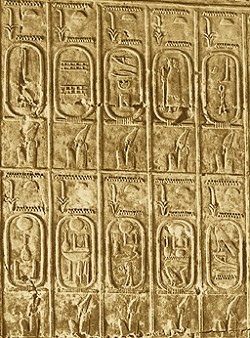
With the arrival of Alexander the Great in Egypt in 332 BC, the Greek period began, also referred to as the Ptolemaic Period. Alexander, who received the country peacefully from the satrap Mazakes, was crowned pharaoh in the traditional manner. He was also recognized as the son of the god by the oracle of Amun in the Siwa oasis. The city of Alexandria was founded by him and in a short space of time it was to become the centre of culture and science in the Hellenistic world. After his death in 323 BC, the body of Alexander was brought back to Egypt for burial. His generals shared out his empire between them, with Egypt falling to Ptolemy. At first he only functioned as viceroy for Philip Arrhidaeus, a brother of Alexander, but in 305 BC Ptolemy himself became king. He and his successors were depicted as pharaohs in the temples, making offerings to the Egyptian gods. Nevertheless, perhaps as a bridge between the various religions in the Hellenistic world, a new god was also introduced called Sarapis. In him the god Osiris and the Apis bull were united, but also Greek gods and gods from Asia Minor. A special temple for Sarapis was built in Alexandria. In 283 BC Ptolemy I died. He was succeeded by a series of kings all with the same name. Under Ptolemy II, the construction of a temple to Isis on the island of Philae was begun. The Egyptian priest and historian Manetho dedicated his history of Egypt to this king. In his book he listed all the kings who ruled Egypt, from Menes down to Ptolemy II, and divided them into dynasties. Under Ptolemy III the construction of the temple of Edfu was begun. The Rosetta stone, the key to the decipherment of the hieroglyphs, was erected in 196 BC under Ptolemy V. The last stages of the Ptolemaic Period are characterised by much fighting for the throne, with the victors challenging and succeeding each other in swift succession. The end of the period was the reign of Cleopatra VII and her brother Ptolemy XIII, who initially ruled together. The Roman Pompey, who fled to Egypt, was killed by Ptolemy. Julius Caesar came to Alexandria in 47 BC, and shortly afterwards Ptolemy fell. The library of Alexandria, with innumerable valuable papyri, burnt down. Cleopatra bore Caesar a son, called Caesarion (=Ptolemy XV). In 41 BC she allied herself with Mark Antony, who at first expanded Egypt's territories with donations to Cleopatra and by conquests, but was eventually defeated by Octavian. In 30 BC Octavian (=Augustus) conquered Alexandria and with this event the Roman Period began.